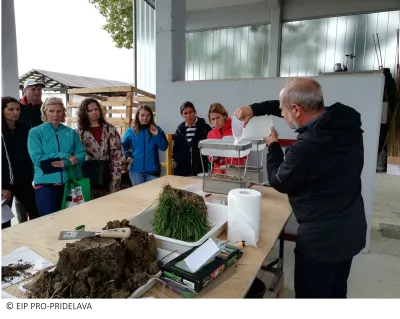General information
RDP Priority
- P2. Competitiveness
RDP Focus Area
- 2A: Farm’s performance, restructuring & modernisation
RDP Measure
- M16: Cooperation
Summary
This EIP AGRI operational group aimed at establishing an Irrigation Decision Support System (IDSS) at national level for the optimisation of irrigation practices. Based on the advice of the IDSS, farmers decide on the time and amount of water to add. The main activities were the development and public use of the IDSS and the training of farmers, agricultural advisers, students, professionals and lay public on irrigation technologies, including the installation of water meters in the soil on participating farms.
Results
The results of the IDSS system, which maintains the water content at 85% of the field capacity, showed a 25% reduction in water consumption.
Calculations have shown that this also means a reduction in energy consumption and carbon dioxide emissions of 24% (Cvejić et al., 2020).
Corn grain production results confirm that the yield on light soils was practically the same at 85% field capacity (13.43 t/ha) as it was at 100% (13.83 t/ha).

Promoter
Univerza v Ljubljani * The Project promoter/beneficiary is an EIP-AGRI Operational Group (https://ec.europa.eu/eip/agriculture/en)
Funding
Total budget 249 940 (EUR)
EAFRD 199 952 (EUR)
National/Regional 49 988 (EUR)
Ressourcen
Documents
contact

